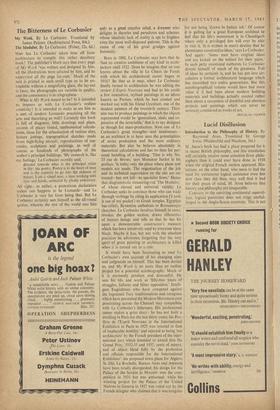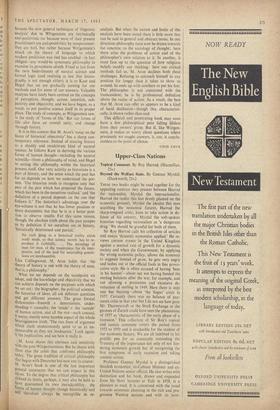Lucid Disillusion
Introduction to the Philosophy of History. By
Raymond Aron. Translated by George Irwin. (Weidenfeld and Nicolson, 36s.) M. ARON'S book has had a place prepared for it in recent British philosophy, and this translation will certainly receive more attention from philo- sophers than it could ever have done in 1938 when the original French version appeared. His- torians, on the other hand, who seem to feel the need for extraneous logical assistance even less now than they did then, may well find it bad for their peace of mind. M. Aron believes that history and philosophy are inseparable.
Contrary to the surviving continental supersti- tion, logical positivism does not reign unchal- lenged in the Anglo-Saxon countries. This is not
because the now general techniques of 'linguistic analysis' due to Wittgenstein are intrinsically anti-positivistic (or because most of their present practitioners are anti-positivistic by temperament: they arc not), but rather because Wittgenstein's attack on the theory of language to which modern positivism was tied has enabled—in fact obliged—any would-be systematic philosophy to examine its procedures afresh. Freed at last from the twin bedevilments of natural science and formal logic (and realising at last that lexico- graphy is not enough either), it is to Kant and Hegel that we are gradually turning for our methods and for some of our answers. Valuable analyses have lately been centred on the concepts of perception, thought, action, intention, sub- jectivity and objectivity, and we have begun, as a result, to put positive science itself in its proper place. The study of concepts, as Wittgenstein saw, is the study of 'forms of life.' But our forms of
life also have an overall unity, and change through history.
It is in this context that M. Aron's 'essay on the limits of historical objectivity' has a sharp con- temporary relevance. Instead of treating history as a shoddy and recalcitrant kind of natural science, he follows Kant in deriving the various forms of human thought—including the natural scientific—from a philosophy of mind, and Hegel in setting this philosophy within the historical process itself. Our very activity as historians is a part of history, and the sense which the past has for us depends on how we understand the pre- sent. 'The historian tends to recognise only that part of the past which has prepared the future, which has been in the meantime realised.' and 'the definition of a period depends on the one that follows it.' The historian's advantage over the eye-witness is not that he has fewer passions or more documents, but that he is in a better posi- tion to observe results. For this same reason, though, the absolute truth about the past escapes us by definition if we ourselves are in history. 'historically determined and partial.'
No such thing as a historical reality exists ready made, so that science merely has to re- produce it faithfully. . . . The meanings of man for man, of the masterpiece for its inter- preters, and of the past for succeeding genera- tions are inexhaustible.
Like Collingwood, M. Aron holds that 'the theory of history is one with the theory of man, that is, a philosophy.'
What we see depends on the standpoint we adopt, and the knowledge and objectivity that we can achieve depends on the purposes with which we set out : the biographer, the political scientist, the historian of ideas, all ask different questions and get different answers. The great formal
dichotomies—freewill v. determinism, under- standing v. causality, the 'inside' v. the 'outside' of human action, and all the rest—each conceal, it seems, merely some humble aspect of the whole heterogeneous truth. 'The two lines of argument Which clash monotonously seem to us as un- answerable as they are inadequate.' Look again, is the implication, and see how it really is.
M. Aron shares this alertness and sensitivity with the post-Wittgensteinians. But he shares with them also the crisis that confronts philosophy today. The great tradition of critical philosophy that began with Descartes has now run its course: M. Aron's book is one of the last important general statements that we can expect in this idiom. To the degree that critical philosophy has defined its limits, perhaps, it may also be held to have guaranteed its own ineradicability: the forms of human thought change historically and Will therefore always be susceptible to re-
analysis. But when the nature and limits of this analysis have been stated there is little more that can be said in general and abstract terms. In one directions philosophy must now be drawn towards the concrete, to the sociology of thought : here 'there arise the problems of action and of the philosopher's own relation to it. In another, it must face up to the question of how religious beliefs modify our thinking: here our critical methods fail us. M. Aron declines both these challenges. Refusing to entrench himself in any position for longer than it takes to show us around, he ends up with nowhere to put his feet. The philosopher is not concerned with the transcendent; he is by professional definition above the realm of action. As a result, the best that M. Aron can offer us appears to be a kind of lucid disillusion—though this, characteristi- cally, is shown rather than said.
This difficult and penetrating book may soon have a few philosophical pens falling lifeless from their owners' grasp. But if, like Wittgen- stein, it makes us worry about questions where previously we sought answers, it, too, is conclu- sionless to the point of silence.
COL1N FALCK







































 Previous page
Previous page